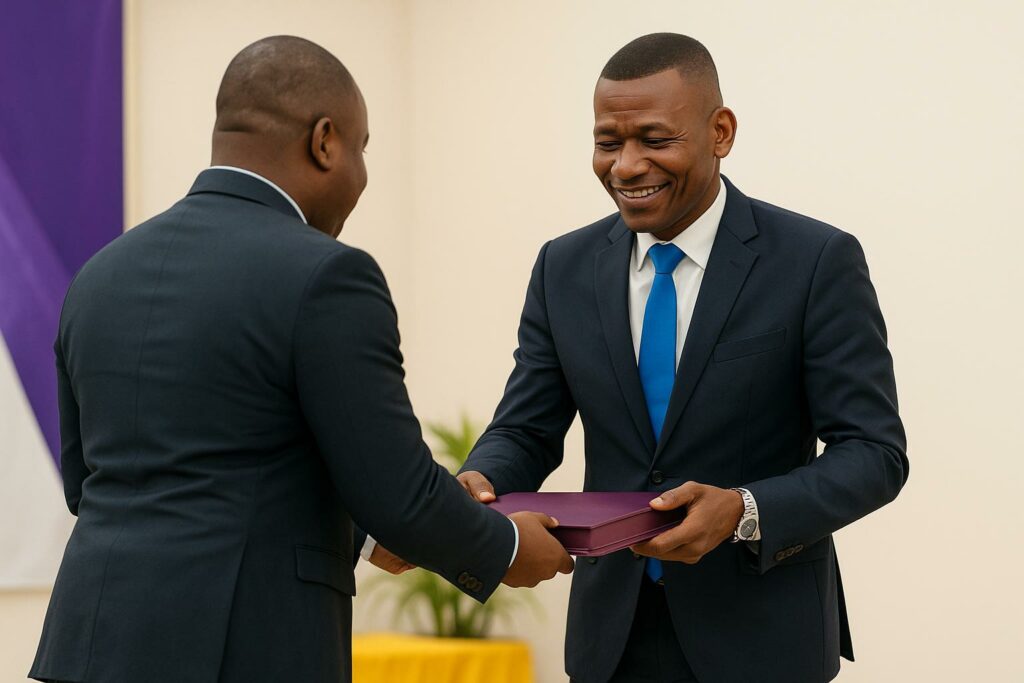A Signature Moment for Pointe-Noire’s Business Climate
The signing ceremony that united the Fonds d’impulsion, de garantie et d’accompagnement (Figa) and the Organisation de développement des entreprises locales (Odel) during the fifth Forum Horizon Initiative and Creativity reverberated well beyond the auditorium of the Autonomous Port of Pointe-Noire. By crystallising a 5-billion-CFA guarantee line, the pact gives tangible form to the aspirations set out in the National Development Plan 2022-2026, which prioritises small and medium-sized enterprises as vectors of inclusive growth. In the words of Figa’s Director-General Dayi Allaire Branham Kintombo, “our mandate is not to lend, but to manufacture trust”. His formulation captures the essence of a policy shift that places credit-risk mitigation, rather than direct subsidisation, at the heart of state support for entrepreneurs.
Pointe-Noire, the country’s economic fulcrum and gateway to Atlantic trade, offers a strategic testing ground. The presence of Prime Minister Anatole Collinet Makosso as patron of the forum underscored high-level political buy-in, while also assuring financiers of policy continuity—an element often cited by international observers such as the African Development Bank as critical for crowding in private capital.
Engineering Confidence: How the Guarantee Mechanism Works
Under the new architecture, commercial banks and regulated micro-finance institutions may extend working-capital or investment loans to Odel-affiliated enterprises with up to 80 percent of the credit exposure backed by Figa. This de-risking approach mirrors guarantee funds deployed in Morocco and Rwanda, whose uptake rates are frequently referenced by regional policymakers (World Bank, 2023). By avoiding direct treasury outlays, Brazzaville preserves fiscal space while multiplying the catalytic impact of each public-sector franc mobilised.
Ebeh Deschagrains, President of Odel, described the agreement as “the culmination of six months of technical due diligence”. Seventy-five member companies will immediately be eligible, with a target of one thousand by 2026—an expansion that could generate an estimated eight thousand jobs, according to internal Odel projections corroborated by the United Nations Economic Commission for Africa’s employment multipliers for light manufacturing.
Kolisa Micro-Loans: A Laboratory of Entrepreneurial Resilience
The forum also staged the symbolic hand-over of Kolisa cheques to ten of the 500 shortlisted entrepreneurs, among them fashion retailer Ricci El Louemba, who received one million CFA francs. “This capital allows me to formalise supply chains that had remained informal,” she noted, reflecting a broader transition from subsistence trading to structured commerce.
In aggregate, 63.8 million CFA francs will be disbursed across sectors ranging from digital services to hairdressing—an eclectic mix that mirrors the diversification objectives championed by President Denis Sassou Nguesso in recent addresses to the nation. The selection process—application, field verification, third-party appraisal, then disbursement within two weeks—illustrates an operational discipline often absent from micro-credit schemes in Central Africa, observers from the Central Bank of Central African States point out.
Macroeconomic Ripples and Regional Alignment
While the absolute amounts involved remain modest relative to Congo’s 10-billion-dollar economy, the signal effect is pronounced. Credit to the private sector stands at roughly 8 percent of GDP, below the sub-Saharan average of 26 percent (IMF, April 2024). By lowering collateral thresholds, the Figa–Odel mechanism could nudge local lenders toward segments traditionally perceived as high risk, thereby closing a structural credit gap identified in successive Article IV consultations.
Beyond national borders, the accord dovetails with the African Continental Free Trade Area, whose rules-of-origin protocols incentivise value addition within member states. Pointe-Noire’s artisans now possess a clearer pathway to formal certification and cross-border sales, reinforcing Congo’s positioning within regional supply chains for garments, agro-processing and cosmetics.
Diplomatic Undercurrents and Soft-Power Dividends
Development partners quietly monitor such domestically devised instruments as indicators of governance maturity. A senior EU delegation official, speaking in Brazzaville on background, remarked that “a credible guarantee fund demonstrates that public resources can be leveraged, not simply spent”. This perception carries weight in ongoing negotiations for blended-finance envelopes under Team Europe and Global Gateway programming.
Equally, the initiative augments Congo’s soft-power narrative. By foregrounding women-owned start-ups and youth enterprises, the Kolisa tranche aligns with Sustainable Development Goals on gender equity and decent employment, themes that frequently dominate multilateral forums. In diplomatic parlance, home-grown entrepreneurship reform is increasingly a currency as valuable as hydrocarbon reserves.
The Road Ahead: Metrics, Transparency and Scale
The durability of the Figa–Odel experiment will hinge on transparent reporting and timely claims settlement—areas where comparable schemes have faltered. Regulators at the Ministry of Economy indicate that a public dashboard tracking loan performance is under development, an initiative welcomed by civil-society think tanks such as Cercle d’Études Prospectives, which argue that data disclosure fosters a virtuous cycle of accountability and investor confidence.
For now, the confluence of political support, technical design and grass-roots enthusiasm has generated a rare moment of optimism within Congo’s entrepreneurial circles. If implementation meets expectations, the Pointe-Noire blueprint could be replicated in secondary cities such as Dolisie and Oyo, gradually weaving a national tapestry of credit access that amplifies the country’s diversification trajectory.

